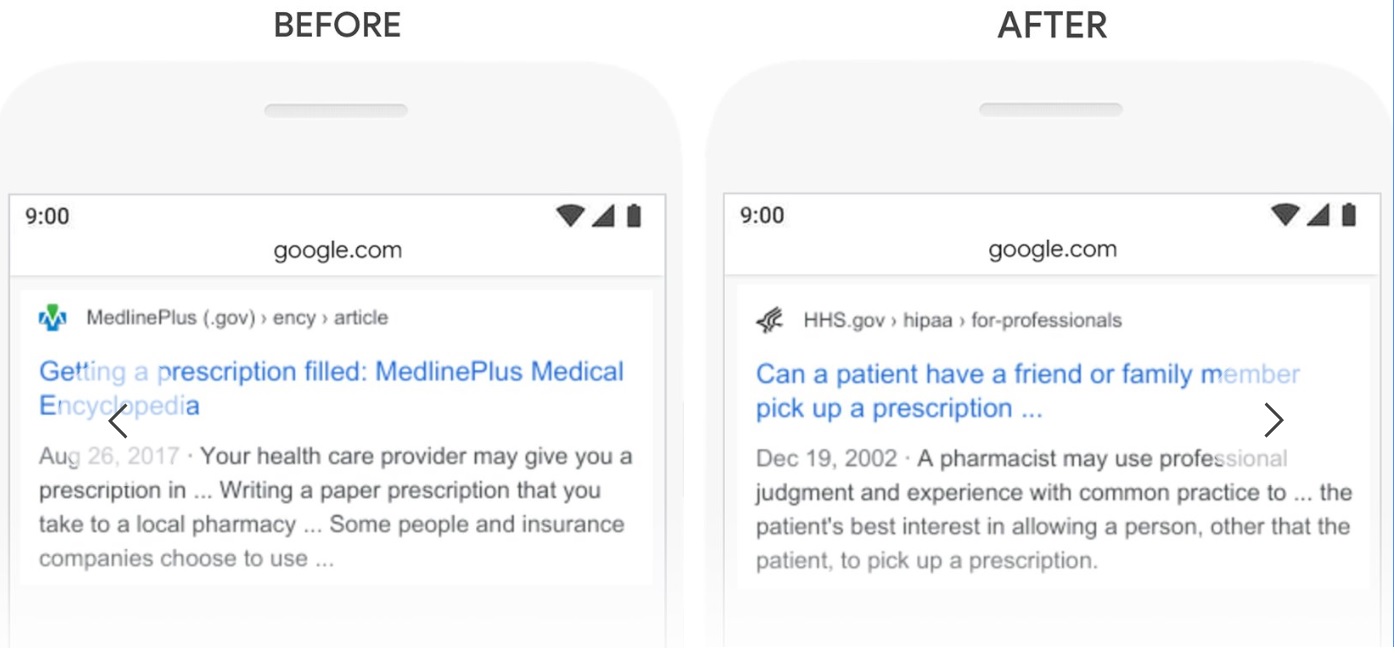 On October 25, 2019, Google announced the BERT update which impacts search results. In a nutshell, this is a great update which helps Google produce more relevant search results for longer / natural language / conversational search queries.
On October 25, 2019, Google announced the BERT update which impacts search results. In a nutshell, this is a great update which helps Google produce more relevant search results for longer / natural language / conversational search queries.
A BERT example:
Instead of a keyword, such as “pizza”, many people search using “natural language”.
Here’s a great example of natural language (aka conversational) search query:
“Can you get medicine for someone at a pharmacy?”
I’d imagine that this is a very common search term. If you’re sick, you may want your spouse or kids to run and grab your prescriptions while you’re at home, lying in bed.
Here’s a before and after of what the search results will look like before/after BERT (I’ll explain more below as well):
Historically, Google would have shown you this page from a high authority website, medlineplus.gov. However, this page is about getting a prescription filled. It correctly explains the process of getting a prescription from a doctor, but, it has absolutely nothing at all to do with a loved one picking up your script for you at the drug store.
Now, thanks to BERT, Google should show you this page from hhs.gov (although, at the time of this article Google’s own example is not working). Anyways, this page clearly and officially answers the question. In fact, the page reads “Yes. A pharmacist may use professional judgment and experience with common practice to make reasonable inferences of the patient’s best interest in allowing a person, other that the patient, to pick up a prescription.“
When did BERT roll out?
At the time of this article, BERT (Bidirectional Encoder Representations from Transformers) impacts US queries (in English) and Featured Snippets worldwide. We have no official timetable of the BERT rollout, although if I were to guess, I think it is still rolling out as of October 26, 2019. I think the rollout began October 21, 2019. On October 22, 2019, there was definitely fluctuations in Featured Snippets. One site I work with in the UK lost their snippets, and RankRanger is showing a surge in snippets in search results beginning October 22.
NOTE: There was an unrelated algorithm update October 23, 2019.
Here’s a screenshot from SEMrush Sensor showing the increase in Featured Snippets:
How To Optimize for BERT:
Many SEO experts worldwide immediately declared that you can not optimize for BERT.
I totally disagree.
First let me say that I’ve said for over 20 years that you should create content for PEOPLE, and, I think that’s what most people are getting at. I’ve said many times I’d rather have the rules of baseball described by an umpire instead of an SEO guru. It’s the search engine’s job to connect searchers with the content they’re looking for, and hopefully they continue getting better and better at that as time goes on. However, to be blunt, many subject matter experts are terrible at creating content, and even if they do create content, they may not know how to structure that content, and even if they got all that right, ranking the content is a whole new ballgame, too.
With that established, let’s look at optimizing for BERT.
To optimize for BERT, you could:
- Create content which answers people’s questions.
- Monitor competitor’s traffic and popular pages.
- Structure your content with Featured Snippets as a goal.
Using Google’s own example above, medlineplus.gov used to get the traffic for the search query “Can you get medicine for someone at a pharmacy?”, but now hhs.gov gets that traffic. If medlineplus wanted to compete for that traffic, they should create a page specifically answering that question. Alternatively, in some cases, it may make the most sense to add that content to their existing page. Better yet, GoodRX.com, an online pharmacy comparison site, could go create this content better than hhs.gov did, probably outrank them, and get a ton of traffic from people who are purchasing prescriptions that don’t want to leave the house!
So, yeah. You can optimize for BERT. Essentially what I’m saying is by having the content on your site which answer’s people’s search queries, you’re optimizing for BERT.
Some people will say that isn’t optimizing for BERT. But, it is. Unless you create content for a living, or you’re infatuated with adding content to your company’s website from a subject matter expert, there’s almost no chance you’ll accidentally create the content needed to get traffic from natural language search queries. In all of my days of content consulting I’ve never once seen a site that can’t improve on their content creation. Just the words “create content for people” leaves most people scratching their heads.
BERT only impacts about 10% of searches.
According to Google, approximately 10% of searches use conversational queries. Indeed, many searches are simply for “pizza” or “coffee” when someone is hungry or seeking some caffeine.
Google’s Pandu Nayak put it very well in the announcement:
When people like you or I come to Search, we aren’t always quite sure about the best way to formulate a query. We might not know the right words to use, or how to spell something, because often times, we come to Search looking to learn–we don’t necessarily have the knowledge to begin with.
Additional reading:
If you’d like to read more about Natural Language Processing (NLP), BERT and machine learning, you may enjoy these articles:
- Lyrn.ai: BERT – State of the Art Language Model for NLP
- BERT (Bidirectional Encoder Representations from Transformers) paper published by researchers at Google AI Language.
- Google’s announcement, Understanding searches better than ever before
- Google AI Blog: Open Sourcing BERT: State-of-the-Art Pre-training for Natural Language Processing
- Kaushal Trivedi’s article: Multi-label Text Classification using BERT – The Mighty Transformer
- More on OpenAI Transformer: Improving Language Understandingby Generative Pre-Training
- ELMo and Deep contextualized word representations
- Danny Luo’s presentation (YouTube): [BERT] Pretranied Deep Bidirectional Transformers for Language Understanding (algorithm) | TDLS
Recap:
What this means for people using Google: You can now search google using more normal language and Google is going to understand you better.
What this means for webmasters: Google is understanding the context of people’s search queries better. Keep creating and ranking content and structuring it well.
- Google “Pure Spam” Penalty Deindexes Sites March 6 2024 - March 12, 2024
- What Happened to ChicagoNow.com? - August 30, 2022
- The December 2021 Google Local Pack Algorithm Update - December 17, 2021







Almost 1-month passed for BERT update but I am still seeing fluctuation in ranking for one of my websites. Initially, 2 weeks’ keywords are fluctuating and ranking dropped suddenly. Even I got an error on the search console of Schema. Now it’s improving from the last 10 days along with fluctuation.